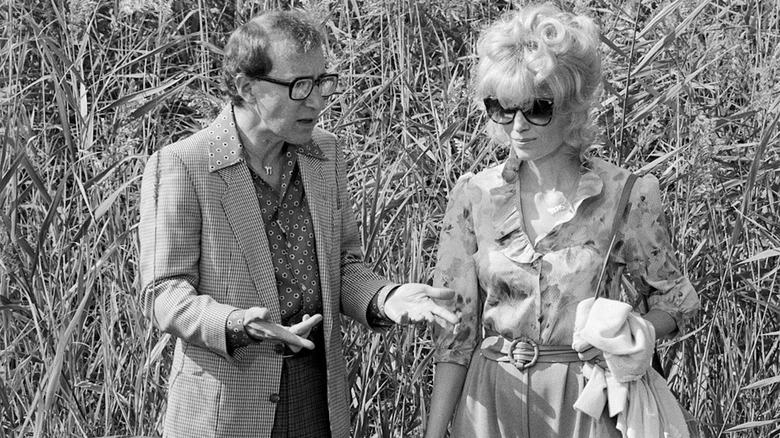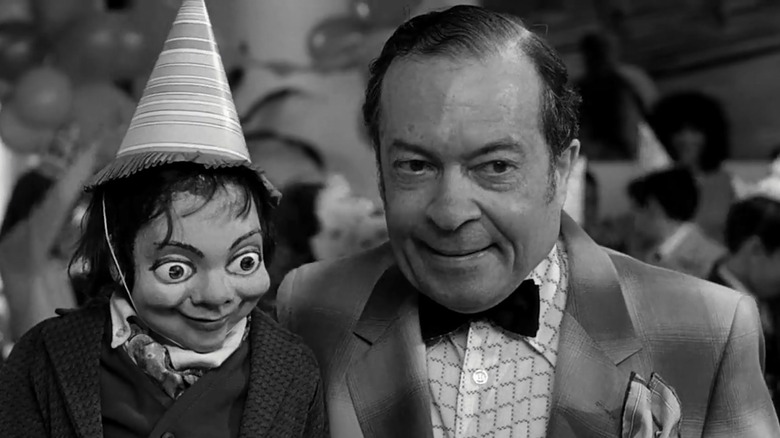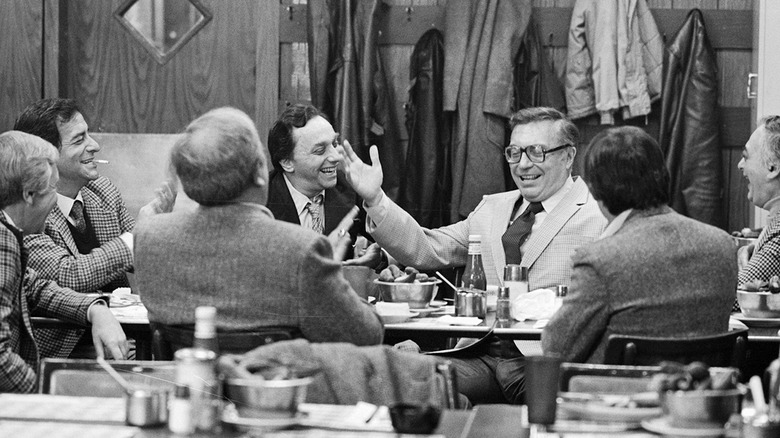The Only Mia Farrow Movie That Has A Perfect Rotten Tomatoes Score
After briefly slipping up in the early 1980s with the introspective "Stardust Memories" and "A Midsummer Night's Sex Comedy," Woody Allen rediscovered his comedic muse with the run of "Zelig," "Broadway Danny Rose," "The Purple Rose of Cairo" and "Hannah and Her Sisters." Factor in 1989's "Crimes and Misdemeanors," and you could make a compelling case that, aside from a few failures, Allen had matured into one of our finest satirists.
While I think his most witheringly downbeat statement on the creation of art arrived a decade later in the sublime "Bullets Over Broadway," he made his warmest statement on New York City theater via 1984's kind-hearted "Broadway Danny Rose." The tale of a one-man talent agency (Allen) who works tirelessly to keep his collection of C-level talents gainfully employed (and gets caught up in a mob-related love triangle in the process) is rivaled only by "The Purple Rose of Cairo" and "Radio Days" for its sweetness. These are films that plunge their characters into the morass of a rapidly changing entertainment industry: some of these characters want to meet the transporting voices that crackle through their Philco; some want to be them; and, in "The Purple Rose of Cairo," one unloved woman wants to flat-out live in the black-and-white universe of her favorite movie.
As the star of Allen's '80s triumphs until Woody fell in love with Mia Farrow and Andre Previn's adopted daughter Soon-Yi in the early 1990s, Farrow evinced a versatility and vitality that, strangely, felt taken for granted. She is only absolute perfection in "The Purple Rose of Cairo" and "Hannah and Her Sisters," but, all these years later, she's never been nominated for a single Academy Award. She does, however, have a 100-percent fresh film sitting at Rotten Tomatoes, and, amazingly, it's not for one of Allen's most universally celebrated films.
A Thanksgiving feast of quirky talents
Woody Allen never seemed terribly enamored of his various professions. He saw compromise in theater, artlessness in movies, and straight-up vulgarity in television. His protagonists were often men who cared about artistic integrity to a self-destructive career.
"Broadway Danny Rose" is not Allen's finest work of the Reagan era, but it is his most generous. Typically, there's a contemptuous distance between Allen and his characters. He views his heroes as fools, and their lovers as dupes or self-involved heartbreaks in the making. The struggling performers in "Broadway Danny Rose" are real and, in many ways, kind. Best of all, they're surprising. Farrow is a revelation as an Italian force of feminine nature who sucks down cigarettes like they're s***-talking fuel. Meanwhile, Allen is an agent committed to serving his clients, and getting them the best work commensurate with their talent.
And it may just be the best (non-horror) Thanksgiving movie ever made.
A man immortalized with a sandwich at the Carnegie Deli
"Broadway Danny Rose" is the film you show to Woody Allen newcomers who can't decide if he's guilty of having molested his three-year-old daughter (I've done loads of reading on the charges, and I won't tell anyone what to think, but if Moses Farrow's account of his upbringing is to be trusted, it sounds like all of the children in this misbegotten relationship fared poorly). It's very funny, refreshingly brief (it runs all of 84 minutes), and will leave you grinning wistfully.
"The Purple Rose of Cairo" is every bit as good as "Broadway Danny Rose" (and features bigger laughs), but the latter also functions as a swooning mash note to New York City. I know that world well and feel confident you'll understand it, too, before Danny receives the ultimate Manhattan honor: a sandwich named for him at the legendary (and since shuttered) Carnegie Deli. This can't top the Gershwin cue at the end of "Manhattan," but at least the film doesn't cut to the closing credits with Allen's character grinning at a high-school-aged lover.


